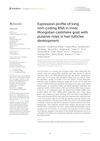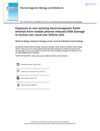 February 2023 in “Journal of Ginseng Research/Journal of ginseng research”
February 2023 in “Journal of Ginseng Research/Journal of ginseng research” New ginseng compounds may help treat degenerative diseases.
 November 2023 in “International Journal of Biological Macromolecules”
November 2023 in “International Journal of Biological Macromolecules” The gelatin-based hydrogel helps heal acute and diabetic wounds faster by improving healing conditions.
 86 citations,
June 2017 in “Anais Brasileiros de Dermatologia”
86 citations,
June 2017 in “Anais Brasileiros de Dermatologia” Antioxidants can benefit skin health but should be used carefully to avoid negative effects.
 5 citations,
July 2021 in “Basic & Clinical Pharmacology & Toxicology”
5 citations,
July 2021 in “Basic & Clinical Pharmacology & Toxicology” Melatonin may protect ear cells from damage caused by nicotine.
 2 citations,
September 2022 in “Frontiers in veterinary science”
2 citations,
September 2022 in “Frontiers in veterinary science” Certain long non-coding RNAs are important for the growth of hair follicles in Inner Mongolian cashmere goats.
 September 2020 in “Research Square (Research Square)”
September 2020 in “Research Square (Research Square)” Researchers found that certain RNA sequences play a role in yak hair growth and these sequences are somewhat similar to those in cashmere goats.
 25 citations,
April 2018 in “Electromagnetic biology and medicine”
25 citations,
April 2018 in “Electromagnetic biology and medicine” Mobile phone radiation may cause DNA damage in human ear hair follicle cells.
 September 2023 in “Nature communications”
September 2023 in “Nature communications” Alk1 in specific cells is crucial for proper nerve branching and hair function.
 April 2023 in “Tikrit journal of pharmaceutical sciences”
April 2023 in “Tikrit journal of pharmaceutical sciences” Ginger extract helps hair growth and reduces the need for prednisolone in alopecia areata patients.
 April 2018 in “Journal of Investigative Dermatology”
April 2018 in “Journal of Investigative Dermatology” Stabilizing HIF1A in hair follicles increases glycolysis, which may help reduce oxidative stress and support hair growth.
24 citations,
November 2015 in “International Journal of Cosmetic Science” Treating scalp issues with anti-dandruff shampoo improves hair health.
 3 citations,
June 2023 in “Frontiers in medicine”
3 citations,
June 2023 in “Frontiers in medicine” Oxidative stress may contribute to hair loss in alopecia areata and antioxidants could potentially help as a treatment.
 July 2024 in “Clinical Cosmetic and Investigational Dermatology”
July 2024 in “Clinical Cosmetic and Investigational Dermatology” Non-drug therapies show promise for hair regrowth but need more research.
 July 2022 in “Journal of Investigative Dermatology”
July 2022 in “Journal of Investigative Dermatology” Substance P may contribute to hair loss by increasing oxidative stress and mitochondrial activity in hair follicles.
 June 2006 in “Almustansiriya journal of pharmaceutical sciences/Al-Mustansiriyah journal of pharmaceutical sciences”
June 2006 in “Almustansiriya journal of pharmaceutical sciences/Al-Mustansiriyah journal of pharmaceutical sciences” Melatonin may help reduce the needed dose of prednisolone and improve hair growth in alopecia areata patients.
4 citations,
August 2023 in “Biomedicine & Pharmacotherapy” Ivacaftor can protect against noise-induced hearing loss by reducing oxidative stress.
 2 citations,
August 2023 in “Marine drugs”
2 citations,
August 2023 in “Marine drugs” Collagen from tilapia scales may improve hair and skin health by reducing stress and inflammation and encouraging hair growth.
 1 citations,
March 2017 in “Al-maǧallaẗ al-’irāqiyyaẗ li-l-’ulūm al-ṣaydalāniyyaẗ/Iraqi journal of pharmaceutical sciences”
1 citations,
March 2017 in “Al-maǧallaẗ al-’irāqiyyaẗ li-l-’ulūm al-ṣaydalāniyyaẗ/Iraqi journal of pharmaceutical sciences” Nutrient antioxidants helped reduce prednisolone dosage and improved hair growth in alopecia areata patients.
 1 citations,
June 2007 in “Almustansiriya journal of pharmaceutical sciences/Al-Mustansiriyah journal of pharmaceutical sciences”
1 citations,
June 2007 in “Almustansiriya journal of pharmaceutical sciences/Al-Mustansiriyah journal of pharmaceutical sciences” Antioxidants can help improve hair growth in people with alopecia areata.
 9 citations,
January 2017 in “Annals of Dermatology”
9 citations,
January 2017 in “Annals of Dermatology” The study found genetic differences related to hair development that may explain hair loss in a patient with Trichorhinophalangeal syndrome type I.
 February 2024 in “Biomedicines”
February 2024 in “Biomedicines” Hormones like androgens, estrogen, thyroid hormones, and stress hormones can contribute to hair loss, and treatments target these hormonal imbalances.
 October 2024 in “Current Issues in Molecular Biology”
October 2024 in “Current Issues in Molecular Biology” Platycladus orientalis leaf extract helps hair grow by activating certain proteins.
 5 citations,
September 2020 in “Journal of Cosmetic Dermatology”
5 citations,
September 2020 in “Journal of Cosmetic Dermatology” Dexpanthenol improves hair growth and satisfaction in women without side effects.
 5 citations,
September 2018 in “Bioscience, Biotechnology, and Biochemistry”
5 citations,
September 2018 in “Bioscience, Biotechnology, and Biochemistry” Thiosulfate may help hair grow faster in mice and works well with a common hair growth treatment.
 2 citations,
January 2015 in “Journal of cosmetology & trichology”
2 citations,
January 2015 in “Journal of cosmetology & trichology” Need better hair loss treatments beyond minoxidil, finasteride, and transplants.
 September 2017 in “Journal of Investigative Dermatology”
September 2017 in “Journal of Investigative Dermatology” The new scalp treatment preserves hair color, reduces hair loss, and maintains hair strength.
 102 citations,
January 2003 in “Dermatology”
102 citations,
January 2003 in “Dermatology” Smoking may contribute to hair loss in men.
 79 citations,
January 2017 in “Dermatology practical & conceptual”
79 citations,
January 2017 in “Dermatology practical & conceptual” Correcting nutrient deficiencies may help with hair loss, but the benefits of supplements without a deficiency are uncertain and could be harmful.
 26 citations,
January 2016 in “Annals of Dermatology”
26 citations,
January 2016 in “Annals of Dermatology” Ecklonia cava polyphenols help increase human hair growth and reduce hair loss.
 20 citations,
May 2020 in “Experimental Dermatology”
20 citations,
May 2020 in “Experimental Dermatology” Aging scalp skin contributes to hair aging and loss, and more research is needed to develop better hair loss treatments.




























